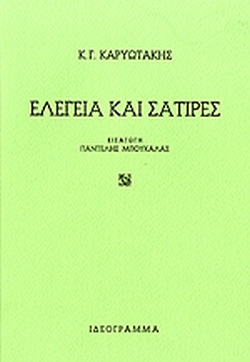ΕΛΕΓΕΙΑ ΚΑΙ ΣΑΤΙΡΕΣ / ELEGIES AND SATIRES
 “>
“>
Autor:
KOSTAS KARYOTAKIS
Country:
Greece (GR)
Book Theme:
Poets representing your country poetry
Publisher:
IDEOGRAMMA
Publishing Year:
1997
Kostas G. Karyotakis (1896-1928) was a Greek poet known for his introspective and melancholic verse. Born in Tripoli, Greece, he struggled with personal and societal challenges throughout his life. Despite earning a law degree, He faced rejection in both his professional and personal life, which fueled his despair and influenced his poetry. His works, marked by themes of alienation, disillusionment, and existential angst, earned him recognition posthumously as a leading figure in Greek modernist poetry. Karyotakis tragically ended his life at the age of 32, leaving behind a poignant legacy of poetic expression that continues to resonate with readers today.
National Award for Children’s and Young People’s
Abstract
“Elegeia kai Satires” (Elegies and Satires) is a collection of poetry by the renowned Greek poet Kostas G. Karyotakis, published posthumously in 1927. The anthology comprises a selection of Karyotakis’s introspective elegies and satirical verses, showcasing his distinctive poetic style and thematic preoccupations.
The elegies in the collection reflect Karyotakis’s profound sense of melancholy and existential despair. Through poignant language and vivid imagery, he explores themes of alienation, disillusionment, and the transience of human existence. Karyotakis’s elegies often evoke a sense of longing for an idealized past or an unattainable future, as he grapples with the complexities of modern life and the human condition.
In contrast, the satirical verses exhibit Karyotakis’s biting wit and keen observational skills. He uses satire as a tool to critique societal norms, conventions, and the hypocrisy of the bourgeois class. Through his satirical lens, Karyotakis exposes the absurdities and injustices of contemporary Greek society, offering sharp commentary on politics, religion, and the human folly.
Throughout “Elegeia kai Satires,” Karyotakis demonstrates his mastery of language and poetic form, employing a range of poetic devices to convey his profound insights and emotions. His verse is characterized by its clarity, economy, and evocative power, drawing readers into the inner world of the poet’s psyche.
Overall, “Elegeia kai Satires” is a testament to Karyotakis’s enduring literary legacy and his ability to capture the essence of the human experience with honesty and compassion. Through his elegies and satires, Karyotakis invites readers to confront life’s complexities and contradictions, while also offering moments of beauty, humor, and catharsis.



